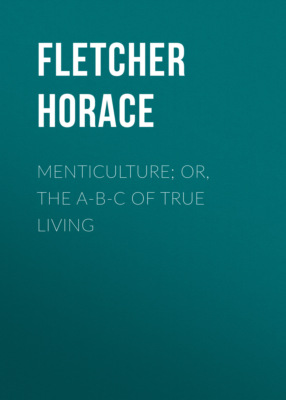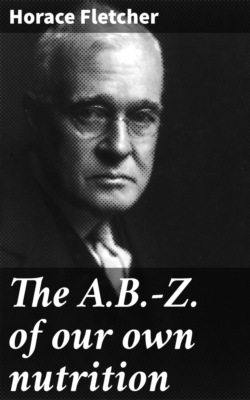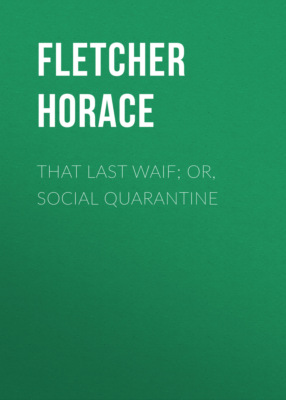Loe raamatut: «Menticulture»
This little paper; being a Kindergarten presentation of a theory of menticulture through the elimination of the germs of the evil passions; proven to be of practical benefit by a personal experience in every-day life; was read before a gathering of Mental Scientists at New Orleans. At the request of a number of my friends I have had it put into printed form for them.
I have added the substance of a discussion which followed the reading of the paper, a diagnosis, a prescription, some scraps of evidence from influential sources which have come to me, some suggestions relative to the tendency to far-away search for happiness, and a ray of hope that it can be found near at hand, through Emancipation.
PREFACE
Medical science had struggled for centuries with the repression and amelioration of physical disease before it discovered the possibility of prevention by killing the germ.
Mental science pursued the same course of attempted repression in this country until quite recently it was found that mental afflictions have germs also, and it naturally follows that any who are interested in the subject should try to discover, not only the germs themselves, but methods of getting rid of them.
The discovery that I have made is not new, as Christ, Buddha, Aristotle, Omar Khayyam and many others, have all suggested that the elimination of the evil passions is entirely possible; but my special analysis of them, and the easy method of defeat that I have found possible to myself, have excited such interest, that I have been induced to publish them, without attempting to follow the subject beyond the elementary stage.
The theory that I have built up is based on a proper estimation of the limitations of mental weaknesses, a discovery that they have roots, and also that they can be "pulled out by the roots" and disposed of just like any other weeds; only that the task, being mental and not physical, can be more easily performed.
Literary grace has been sacrificed in the belief that redundant reference to the germs will be effective in bringing them into contempt.
THEORY
Anger and Worry are Germs
All of the evil passions are traceable to one of two roots.
Anger is the root of all the aggressive passions.
Worry is the root of all the cowardly passions.
Envy, spite, revenge, impatience, annoyance, selfishness, prejudice, unrest, and the like are all phases of anger.
Jealousy, fear, the belittling of self, the blues, and all the introspective forms of depression are the children of worry.
Anger and worry are the most unprofitable conditions known to man. While they are in possession of the mind, both mental and physical growth are suspended.
Anger and Worry are Thieves
Anger and worry are thieves that steal precious time and energy from life.
Anger is a highway robber and worry is a sneak thief.
Anger and worry are the most potent forms of self-abuse, for the reason that in many cases anger is the result of misunderstanding, and in most cases worry's prophecies never come true; or, if they do, the fulfilment is generally caused by the worry itself.
Anger and worry do not stimulate to any good end.
Anger and worry not only dwarf and depress, but sometimes kill.
Anger and worry are bad habits of the mind and not necessary ingredients.
Anger and worry are no more necessary than other passions civilized man has learned to control, and it is only needful to realize that they are unnecessary in order to make it impossible to feel, much less to show them.
Anger and worry cannot be eliminated through process of repression any more than a weed can be killed by cutting down the stalk, or a cancer can be cured from the surface, or the drinking habit can be gotten rid of by "tapering off." Germ eradication is not only the easiest, but the only sure cure for all physical diseases and mental handicaps.
The dispossession of anger and worry does not cause indifference or encourage indolence.
The natural tendency of the emancipated mind is towards growth, both intellectual and spiritual, just as the tendency of plant life is towards vigorous growth and perfect blossoming, if it is kept free from the gnawings of cankerous worms.
Anger and Worry are Parasites
Anger and worry are as much parasites as are the cankerous worms that attack plants. The intelligent horticulturist knows that the worms are parasites, picks them off his plant, and throws them away too far to return. The intelligent menticulturist of the future will treat anger and worry in the same intelligent manner.
It is not necessary to engage in battle the small army of lesser passions if you concentrate your efforts against anger and worry, for they are all children of these parents. Oppose them with a bold front; make one heroic stand against them and they and all of their children will fly. Disown them once and the ability to re-adopt them will have disappeared with them.
Worry Causes Dissipation
Anger and worry, especially worry, are the cause of most of the drunkenness and other dissipations which are the curses of the age. Excuse for them or temptation to them is found in the desire to smother the depression which they themselves cause.
Anger and worry are creations of the mind, and can be dispelled by the same power that gave them birth.
Anger and Worry are Phantoms
Anger and worry are caused by phantoms that we create within ourselves and whose only strength is that with which we endow them.
Anger and worry are like echoes; they do not exist until we call for them, and the louder we call, the louder is their response. We can never drown them; yet, if let alone, they drown themselves.
Fear is possibly the truer name for the cowardly root-passion than worry; but as they are synonymous, and as anger and worry are more frequently used together, and worry has a less formidable sound, I have chosen to present it for attack under that title.
While the evil passions align themselves into two classes, as the offshoots of Anger and Worry; they are, in fact, all growths from one root. Worry (or fear) is the male principle, as it were, without which, all the others wither and die. For instance; if we do not worry, we do not fear; and if we do not fear aggression, or insult, or slight, we do not become angry. We quarrel most frequently with what we fear is thought or intended by our adversary, and least frequently with what he actually does or thinks. On the other hand our adversary endows us with intentions which he himself creates, and each puts his own fuel on the fire, to increase the heat of the controversy.
In Emancipation there is no fear, (or worry) and consequently no fuel for discord.
Emancipation Disarms
Emancipation is a disarmament which disarms others, but adds strength to itself.
To the Emancipated every moment is a delight, or a moment of calm, during which he is susceptible only to good impressions, and the best interpretation of everything, no matter what the external conditions. Even in cases of sickness, the tendency of the emancipated mind is so inclined to gratitude for the limitations of the calamity, that it has little if any room left for regret. Its thankful appreciation of a half loaf of blessings, leaves no place for disappointment that it is not a whole one, and it certainly has no desire to question the wisdom of the process of evolution to which it is related.
To question or to regret the inevitable seems to the emancipated mind the greatest folly imaginable. It certainly is as foolish as barking at the moon.
"Sweet Sorrow"
"Sweet sorrow" must not be classed with the depressing passions. It is the tenderest expression of love. If tears of love or of sympathy spring to the eyes, do not repress them; do not be ashamed of them; they are like dew from Heaven and promote the growth of the soul.
Neither must friendly rivalry, nor ambition to excel, be classed as aggressions; as they are phases of growth.
Blesses or Curses
The disposition of the Emancipated is to switch the current of the Divine Spark (which is the energy of man) on to wires that connect with motors belted to good acts, and good thoughts, and worthy appreciation, and to cut out the circuits of worry and anger and their branch lines entirely, leaving them to rust and decay through disuse. It is a matter of voluntary selection. The same effort of thought can be made to bless or to curse; can stimulate to good or stimulate to bad; can propel or retard; can aid or obstruct; can nourish or kill.
Perfection is Divinity
Nature uses the same atoms to perform many services of widely differing purpose. Where she is inanimate the blind and dumb law of the "survival of the fittest" rules supreme. In her lowest forms of life this law begins to be modified by selection, and protection from without. In the higher forms of animal life memory, and selection, and division of labor, and provision, and gratitude, show a degree of development that is beautiful indeed; but it is left to man to perfect this development within himself. To him is given the power, through cultivation, to promote, without limit, growth towards Perfection, which is the evidence of Divinity in him.
Soft mist, down-falling, from its cloud domain,
Bathes all the thirsty land with gentle rain;
Again, to Heaven ascends, by sunbeams wooed,
Then plunges back to earth in torrent mood.
As gentle rain it swells the softening seed;
In torrent force, it wrecks with demon greed;
Now, like the radiance of a loving heart;
Now, like the scorching of a lightning dart.
The self-same atom, hidden in a tear.
May shine with love, or note a potent fear;
When bound to others form the flintiest stone;
Or, floating freely, bear the subtlest tone.
Thoughts are like atoms, fashioned by the will;
Each has a mission, charged with good or ill;
Sometimes to bless; anon to desolate;
Love's messenger; or harbinger of hate.
In Nature's hands, one atom plays two parts,
As may be needed in her several arts;
In man alone, should love forever shine;
Displacing hate; proclaiming man Divine.
Love, and Appreciation, and Gratitude, – the ever-present and ever-faithful handmaids of Emancipation, – are the natural and only conditions favorable to growth; they are the less assertive but stronger attributes which are always waiting to occupy the places left vacant by anger and worry, and to fill the "void which Nature abhors." Born of them is that other Divine attribute called Help or Charity, and together they stimulate to good action and good thought, and lift into life that plant of the soul, the Divine Responsibility of each member of the human family.
Anger and worry are the rankest forms of Egotism.
Emancipation not Phariseeism
Emancipation is the reverse of Phariseeism. Phariseeism is self-sufficiency; while Emancipation shows its desire for growth, through the preparation of its mental and spiritual entity for unimpaired growth, by clearing it of the weeds of egotism.
A PERSONAL EXPERIENCE
Ernest Francisco
Fenollosa It was my privilege one evening to be with Prof. Fenollosa in his Japanesque apartment in Boston. Almost every article in view was the product of some Japanese artist who had been the friend of Prof. Fenollosa in Japan. The odor of incense added perceptibly to the calming influence of the environment.
We had met in Japan
Many years ago we had met in far-off Japan amid similar surroundings, and had discussed theories of true living that had been a source of great pleasure to me, and whose influence had been with me to many countries and climes, helping me to enjoy more fully than I otherwise could, the beauties of nature, and of art, and of life.
We were exchanging the experiences of the intervening years, and I became acutely interested in his account of the wonderful degree of culture and self-control attained by some of his Japanese friends through the practice of the Buddhist discipline.
It was all so interesting and beautiful, that under the spell of the recital and the surroundings, I longed to taste some of the sweets of the calm he pictured, and begged him to tell me the process of the discipline, so that perchance I might follow it and reap some of the benefits.
The philosopher saw that I was serious in my desire, and his face lit up with approval as he said, "It is not easy to communicate at a sitting what took me years of study to learn, but I can at least put you in the way of a start. I can tell you where to begin to grow. You must first get rid of anger and worry." "But," said I, "is that possible?" "Yes," replied he, "it is possible to the Japanese, and ought to be possible to us."
I was startled at the suggestion of the possibility of the entire repression of anger and worry. I knew that their repression was counselled by Christianity and Buddhism, and presumably by all codes of religion and ethics; but I had never considered getting rid of them as a human possibility, except under conditions of health and wealth and ease, to which few, if any, ever attain.
Get rid of Anger and Worry
On my walk back to the Parker House, a distance of fully two miles, I could not think of anything else but the words, "get rid," "get rid;" and the idea must have continued to possess me during my sleeping hours, for the first consciousness in the morning brought back the same thought, with the revelation of a discovery, which framed itself into the reasoning, "If it is possible to get rid of anger and worry, why is it necessary to have them at all?" I felt the strength of the argument and at once accepted the reasoning. The baby had discovered that it could walk. It would scorn to creep any longer.
Anger and Worry Instantly Removed
From the instant I realized that these cancer spots of worry and anger were removable, they left me. With the discovery of their weakness they were exorcised. From that time life has had an entirely changed aspect.
Although from that moment the possibility and desirability of freedom from the depressing passions has been a reality to me, it took me some months to feel absolute security in my new position; but, as the usual occasions for worry and anger have presented themselves over and over again, and I have been unable to feel them in the slightest degree, I no longer dread or guard against them, and I am amazed at my increased energy and vigor of mind; – at my strength to meet situations of all kinds, and at my disposition to love and appreciate everything.
Wonderful Photographic Films
I have had occasion to travel more than ten thousand miles by rail since that morning; North, South, East and West, with the varying comforts and discomforts, as they used to be. The same Pullman porter, conductor, hotel waiter, peddler, book-agent, cabman, and others, who were formerly a source of annoyance and irritation have been met, but I am not conscious of a single incivility. All at once the whole world has turned good to me. I am sure the change is not so much in the world as in me. I have become, as it were, sensitive only to the rays of good, as some photographic films of recent invention are sensitive only to certain single colored rays of light.
Sensitive only to Good
If we are wise we never leave school. When the academy and the college have put us through their curriculum, we have still before us the example of Nature, and the walks of Science, and Art, and Brotherhood, in which to search for suggestions to be applied in menticulture. May we not learn a lesson from the newly discovered film?
Should not the chemical condition of selection be more difficult than a similar voluntary mental accomplishment? In comparison with a similar process in physics the more pliable material of the mind ought to be fashioned with greater ease.
A Fortunate Disappointment
I could recount many experiences which prove a brand new condition of mind, but one more will be sufficient. Without the slightest feeling of annoyance or impatience I have seen a train that I had planned to take with a good deal of interested and pleasurable anticipation, move out of a station without me, because my baggage did not arrive. The porter from the hotel came running and panting into the station just as the train pulled out of sight. When he saw me he looked as if he feared a scolding, and began to tell of being blocked in a crowded street and unable to get out. When he had finished, I said to him, "It doesn't matter at all, you couldn't help it, so we will try it again to-morrow. Here is your fee, I am sorry you had all this trouble in earning it." The look of surprise that came over his face was so filled with pleasure that I was repaid on the spot for the delay in my departure. Next day he would not accept a cent for the service, and he and I are friends for life. The sequence of this incident has no bearing on its value, but it has a significance. Had I taken the train I missed, I would have been caught in a wreck in which two persons were killed and several wounded, while my stay over in Cleveland proved to be both pleasant and profitable.
During the first weeks of my experience I was on guard only against worry and anger; but, in the meantime, having noticed the absence of the other depressing and dwarfing passions, I began to trace a relationship, until I was convinced that they are all growths from the two roots I have specified.




















